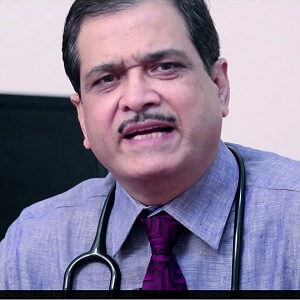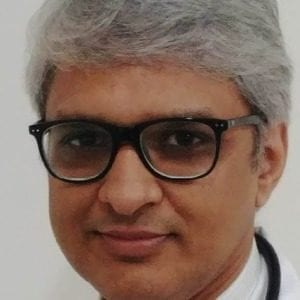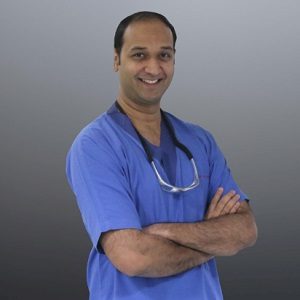Best Doctors in India for Myocardial Perfusion Imaging
- Top Interventional Cardiologist | Apollo Hospital, New Delhi, India
- 26+ Years Experience
- Indraprastha Apollo Hospital, New Delhi
Profile Highlights:
- Dr. Rajeev Kumar Rajput is one of the best Cardiologists in India with nearly 23 years of experience. He is a clinical cardiologist engaged in diagnosing and treating cardiovascular diseases.
- Dr. Rajput is currently working as a senior consultant with Indraprastha Apollo Hospitals, New Delhi, and also offers patient care at the Heart & Gynae Clinic.
- Dr. Rajeev Kumar Rajput specializes in Angiography and Interventional Cardiology. The treatments provided involve Neonatal and Infant cardiac surgeries, Device Closure, and Valve replacement. He has expertise in Aortic Aneurysm Surgery, Vascular Surgery, Percutaneous Coronary Interventions, Endovascular Repair, Cardiac Catheterisation, Open Heart Surgery, and MV replacement.
- Dr. Rajput is credited with publishing several papers in noted medical journals.
- Cardiologist, Gurugram, India
- Over 20 years’ experience
Profile Highlights:
- Dr. Vivek Chaturvedi is a highly experienced and acclaimed cardiologist with over 20 years of experience.
- He has performed more than 2500 cardiac ablations, several of them for complex arrhythmias like atrial tachycardia, ventricular tachycardia, VPC, and atrial fibrillation using the latest technology like 3D Electroanatomic mapping.
- He has more than 50 publications in international journals & books.
- Interventional Cardiologist, Chennai, India
- Over 15 years’ experience
- Apollo Hospitals Greams Road
Profile Highlights:
- Dr. Sai Satish is a distinguished Senior Interventional Cardiologist affiliated with Apollo Hospitals in India, renowned for his pioneering contributions to the field of transcatheter valve therapies.
- His expertise extends internationally, as he also serves as a practicing interventional cardiologist and esteemed faculty member at the Gottsegen Institute of Cardiology in Budapest, Hungary, one of the world’s leading centers for TAVR (transcatheter aortic valve replacement) training.
- A trailblazer in the realm of minimally invasive cardiovascular procedures, Dr. Satish is celebrated for performing the highest number of percutaneous edge-to-edge mitral repairs (MitraClip implants) in the Indian subcontinent.
Best Hospitals in India for Myocardial Perfusion Imaging
- City: New Delhi, India
Hospital Highlights:
- Over the last 33 years, the Fortis Escorts Heart Institute has set new standards in cardiac treatment with groundbreaking research. It is now known around the world as a centre of expertise for Cardiac Bypass Surgery, Interventional Cardiology, Non-invasive Cardiology, Paediatric Cardiology, and Paediatric Cardiac Surgery.
- The hospital has cutting-edge laboratories that perform a wide range of diagnostic tests in Nuclear Medicine, Radiology, Biochemistry, Haematology, Transfusion Medicine, and Microbiology.
- Fortis Escorts Heart Institute boasts a diverse group of bright and experienced doctors who are backed up by a team of highly qualified, experienced, and devoted support professionals as well as cutting-edge equipment such as the recently installed Dual CT Scan.
- Approximately 200 cardiac doctors and 1600 personnel currently collaborate to manage over 14,500 admissions and 7,200 emergency situations each year. The hospital now has a 310-bed infrastructure, as well as five cath labs and a slew of other world-class amenities.
- City: Faridabad
Hospital Highlights:
In the sprawling city of Faridabad, where healthcare needs are diverse and ever-evolving, one institution has consistently stood out as a beacon of excellence in the field of medicine—Marengo Asia Hospital. Established with a vision to provide world-class healthcare services to the community it serves, Marengo Asia Hospital has emerged as a trusted name synonymous with quality, compassion, and innovation in healthcare.
- City: New Delhi, India
Hospital Highlights:
- Equipped with 650 beds, BLK-Max Super Speciality Hospital is the largest stand-alone private sector hospital in Delhi.
- With over 1500 healthcare providers and 150 globally renowned super specialists, the hospital is one of Asia’s largest BMT Centres. The hospital is known for having some of the best cancer doctors in the country.
- The hospital is NABH and NABL accredited and was inaugurated by the first Prime Minister of India. Pt. Jawahar Lal Nehru.
- City: Chennai, India
Hospital Highlights:
- Located in Chennai, India, MGM Healthcare is a top multispecialty hospital that provides all medical services under one roof.
- Since its founding in 2019, MGM Healthcare has quickly become a leading national referral centre, creating several innovative flagship initiatives.
- MGM Healthcare combines next-generation medical and digital technologies to provide better patient results.
- With 12 centres of excellence, more than 400 inpatient beds, 100 intensive care unit beds, and 24/7 emergency care, MGM Healthcare leaves no chance in redefining the patient experience in Chennai.
- MGM Healthcare boasts 250+ expert doctors across 30+ departments, including Cardiology, Pulmonology, Neurology, Obstetrics & Gynaecology, and more.
- They house 12 specialized Centres of Excellence, including Neurosciences, Orthopaedics, and Multi-Organ Transplantation.
- Their team of doctors, nurses, and paramedics works together to give every patient individualized treatment.
- City: Noida, India
Hospital Highlights:
- Fortis Hospital, Noida, stands as one of the oldest and most trusted healthcare institutions in the region, setting a benchmark for comprehensive medical care.
- As the second mega hub hospital in the Fortis Healthcare Group, Fortis Hospital, Noida, upholds a legacy of trust among more than 1.2 million patients. By integrating top-tier professionals with cutting-edge technology, the hospital delivers superior treatment across various medical disciplines.
- Specializing in advanced Neurosciences, Orthopedics, Kidney and Liver Transplant Programmes, Fortis Hospital, Noida has successfully performed over 1,500 transplants, solidifying its reputation as a leader in specialized medical interventions.
Myocardial Perfusion Imaging
Our heart muscle needs a steady flow of blood for functioning properly and staying healthy. Myocardial Perfusion Imaging (MPI) is a non-invasive method that lets your doctor evaluate this blood flow. The scans can also be used to look for damage after a heart attack and for determining if any previous treatment has helped.
While perfusion assessment might require you to exercise, the testing process is safe as well as painless.
Purpose
An MPI test is able to show how well blood is able to flow through the heart muscle. If the test shows a lack of blood flow during stress or exercise but is normal at rest, then it can mean that an artery that carries blood to your heart might be narrowed or blocked.
If the test is showing a lack of blood flow to a portion of the heart muscle during exercise or stress, and at rest, it can mean that your heart muscle is scarred, possible from a previous heart attack.
MPI tests can help your doctor in various ways such as:
- Finding out if there are blockages or narrowings in your coronary (heart) arteries if you are having chest discomfort
- Determining if you need to undergo a coronary angiogram
- Determining if you have heart damage from a heart attack if your heart is not functioning normally
- Deciding whether you would benefit from the coronary stent or bypass surgery for treating your chest discomfort or helping an abnormal pumping function go back to normal
- Determining how well your heart is able to handle physical activity
- Determining if a heart procedure you had to improve your blood flow is working properly
Preparation
Let your doctor know about any medications that you take, such as over-the-counter medicines, vitamins, or herbs. He/she may ask you not to take them before your test. Remember not to stop taking your medication until your doctor tells you to.
Your doctor might ask you to avoid certain foods, such as caffeine-containing beverages, such as tea, coffee or soft drinks, or chocolate, for around 24 hours before the test is performed. The test might need to be postponed or canceled if you consume caffeine.
Remember to wear comfortable and loose-fitting clothing as well as comfortable shoes to exercise in.
Procedure
The test is performed in a hospital or a clinic with special equipment.
The technician places small metal disks known as electrodes on your chest, arms, and legs. These disks have wires that hook up to a machine for recording your electrocardiogram. The ECG can keep track of your heartbeat during the test, and can be used to tell the camera when taking a picture is required.
You will next wear a cuff around your arm in order to keep track of your blood pressure. Your technician will be putting an intravenous line in your arm. Then you will need to exercise on an exercise bicycle or on a treadmill. If you are unable to exercise, due to certain conditions, then your IV line is connected to a bag that has a medicine, for increasing the blood flow, to your heart. This medicine has an effect similar to when you exercise, and makes the heart go faster.
When you reach the peak activity level, you will need to stop after which you will receive a small amount of radioactive material through your IV line.
You will lie still on your table for a few minutes while the gamma camera will take pictures of the heart. During this time, several scans are done to provide pictures of thin slices of your entire heart from all different angles. It is also very important to be completely still with your arms above your head, as the pictures are being taken.
While you are resting, you will be receiving more tracer, and another set of pictures will be taken as well. This set of images is going to be compared to the images taken after exercise or stress.
The test generally takes between 3- 4 hours. Some labs can choose to do the two parts of the test on different days.
After the procedure
You should be able to resume your normal routine right away. Remember to drink plenty of water to flush the radioactive material from your body.
Next, you will need to make an appointment with your doctor in order to discuss the test results and the next steps.
Risks
There are certain risks that are associated with an MPI test.
Sometimes the exercise part of the test can lead to rare instances of abnormal heart rhythms or chest pain. Sometimes it might also lead to a heart attack due to the stress on the heart that is caused by the exercise.
The needle that is used to inject the IV might cause some pain. The injection of the radioactive tracer might also cause a little discomfort. Although rare, sometimes there might be allergic reactions to the tracer.
Make sure you talk to your doctor regarding the amount of radiation used during the procedure and the risks related to your particular situation.
Depending on your specific medical conditions, there might be sometimes a few other risks as well. Therefore before you undergo the procedure, make sure your doctor knows about all your medical conditions.









